The current Supreme Court’s decisions often engender immediate powerful criticism, particularly by left-leaning academics and journalists, but few have engendered the fear and outrage that greeted the Court’s decision in Trump v. United States. Politics and feelings about Donald Trump, no doubt, explain much of the reaction. Trump’s ardent supporters are quietly satisfied with the result, while his political opponents are outraged by the likelihood that Trump may not only never be punished for fomenting the January 6 assault on the Capitol or other election-related crimes that he arguably committed, but there is a diminished likelihood that he will be tried for most of them. By delaying its consideration of Trump’s case for as long as it did, and by issuing the opinion it did, the Court’s majority ensured that even if Trump is not immune from trial for some of the charged crimes, he will not be tried for these crimes before the 2024 election, and voters won’t be able to incorporate any judicial findings in their decisions. Even apart from the Court’s holdings, the timing of its interventions makes it easy for unsympathetic observers to see the Court’s decision as entirely political.
A goal of opinion writing is to convince observers that however unwelcome a holding, its justifications are sufficiently well-reasoned and rest on sufficiently sound legal grounds that the outcome can be explained without reference to the political leanings of the justices in the majority. This is not an onerous test. It does not mean that an observer would be wrong in thinking that the political leanings of particular justices explain why they decided for one party rather than the other. It does mean that, whatever a majority’s motivations, its reasoning and its depiction of law, reality, and precedent must have enough integrity to dispel the notion that only partisan politics can explain the outcome. Perhaps an opinion that both met this standard and gave Trump much of what he sought could have been written. Justice Barrett’s concurrence suggests that she might have been able to write such an opinion. Justice Roberts’ opinion does not, however, clear even this low bar. Although Roberts inserts language that might seem to belie this conclusion, this language is often exposed as a mere veneer when one looks closely at the opinion in its entirety. I expect that totally apart from dismay at the result, flaws in Robert’s reasoning and ends-oriented readings of law and precedent explain how the decision was received and why people are right to feel outraged by it.
A synopsis of the Court’s decision
Before discussing the Court’s reasoning, let me outline key aspects of the majority opinion.
- Former presidents can be criminally prosecuted for unofficial acts committed while in office.
- The constitutional scheme for the separation of powers requires that former presidents have some immunity from criminal prosecution for acts taken while in office.
- Immunity is absolute with respect to a president’s exercise of his core Article II powers.
- Where the president’s power is shared with Congress, “Precedent necessitates at least a presumptive immunity from criminal prosecution for a President’s acts within the outer perimeter of his official responsibility.…[T]he President [is] immune from prosecution for an official act unless the Government can show that applying a criminal prohibition to that act would pose no ‘“dangers of intrusion on the Executive Branch.’”
- In deciding whether an act is official or unofficial, courts cannot inquire into a president’s motives.
- Courts may not deem an action unofficial merely because it allegedly violates a generally applicable law.
- Communicating with the Attorney General is clearly an official act. (Trump sought to have his Acting Attorney General send a letter to the states to discuss investigating purported election fraud, and after the Acting Attorney General refused, repeatedly threatened to replace him.) Trump is absolutely immune from prosecution involving discussions with Justice Department officials.
- Although the vice president is performing a legislative function when presiding over the Senate, as he does in counting the electoral vote, the president must ordinarily work so closely with the vice president that the lower court should on remand determine whether prosecuting Trump for attempting to influence the vice president’s counting of the electoral vote poses a danger of intruding on the authority and functions of the executive branch. On remand it will be the “Government’s burden to rebut the presumption of immunity.”
- The president plays no role in a state’s appointment of presidential electors. Although during oral argument Trump’s counsel initially appeared to concede that Trump’s attempt to have state legislators appoint slates of fraudulent electors was a private activity, he later argued that Trump’s effort was official action because it accorded with the president’s constitutional obligation to ensure that the law was faithfully executed, and that the attempt was also protected by the president’s broad power to speak on matters of public concern. Because the Court was not briefed on whether Trump’s attempt to influence state legislators was campaign conduct or protected official activity, the issue would be remanded to the lower court for resolution.
- Because questions regarding Trump’s communications before and on January 6 are so intertwined and fact specific, the decision as to whether these communications were official statements or statements made by Trump in his private capacity, is for the District Court to make on remand.
- If the president is tried for unofficial acts, evidence of his official acts may not be used to shed light on the criminality of his unofficial actions.
- Former presidents may be tried criminally even if they have not been impeached.
Analysis of the decision
In thinking about the Court’s decision, the first and last of these propositions are widely accepted and non-contentious, but the other six are not generally accepted and are poorly justified, if they can be justified at all.
Most authorities would agree that presidents have some immunity for acts taken while in office, and the government conceded that in some spheres presidential immunity is absolute. However, the government’s idea of which actions enjoy absolute immunity differed markedly from what the defense argued, and the Court held. The government would confine any immunity to powers that the Constitution explicitly vests in the president as office holder. These powers include serving as commander in chief of the United States Army and Navy, the ability to demand written opinions of the principal officers of the executive departments regarding matters within their duties, the power to grant reprieves and pardons for offenses against the United States and, with the advice and consent of the Senate, appointing various officials, including ambassadors, judges, and cabinet officers. By this reading, presidents could not be criminally punished for pardons or reprieves they granted, for their choices of people to appoint to judgeships or other high offices or for at least some actions they authorized as the military’s commander in chief.1
The Court, however, held that the president enjoys absolute, not presumptive, immunity for conversations with the attorney general because of the president’s official relationship to the office holder. But the fact that the Constitution gives the president plenary authority to name an attorney general, so long as the Senate consents, and the recognition that as chief executive the president is authorized to direct the attorney general to focus on particular law enforcement priorities or to otherwise exercise his discretion in certain ways does not mean, or at least did not before this case, that the Constitution allows a president to order the attorney general to break the law, or that a president can avoid criminal prosecution if he does so. If it were otherwise, a sitting president could, without fear of later prosecution, order the attorney general to initiate a baseless prosecution against a political rival or to start a tax audit of a business that had refused to contribute to his campaign. The notion that the Framers, who were intent on ensuring that the president lacked the powers of a king, would have given the president such power is unthinkable. The only power that the Constitution explicitly vests in the president with respect to the attorney general is the power to choose who serves in that office, so long as two-thirds of the Senate consents.
Moreover, when dealing with other charges, the Court, despite the delay it entails, has remanded the case for an original decision by the District Court, in part because the Supreme Court wasn’t fully briefed on the issues involved. The Court was similarly not fully briefed on the president’s relationship to the attorney general and, in particular, on whether a president enjoys absolute immunity for crimes committed through communications with the attorney general, but Roberts has no qualms about deciding this issue rather than remanding or seeking a supplemental briefing. The Court’s unspoken justification for the difference is, I expect, that the issue it resolves involves a question of law rather than one of fact. But this is true only in a limited sense. Surely facts surrounding the Constitution’s grant of the appointment power and early understandings of the president’s relationship to the officials he appoints has a part to play in the Court’s analysis. Briefing on relevant constitutional history and the benefit of lower court opinions could only improve the Court’s handling of this fundamental constitutional question.
The contrast with the Court’s treatment of Trump’s efforts to interfere with several states’ choices of electors is striking. As the Court recognizes, choosing state electors relates to no power that the Constitution vests in the president. But because the issue had not been adequately briefed—not a problem in nullifying the charge relating to conversations with the Attorney General—and because, Trump’s attorneys suggested in oral argument that attempting to intervene in a state’s choice of electors might in some way relate to a president’s duty to ensure that federal laws be faithfully executed, the Court conjured out of thin air a possible factual dispute and argued that this, along with inadequate briefing, meant the case must be returned to the District Court for an initial determination of whether Trump’s attempt to persuade states to appoint fraudulent electors was presumptively protected official action. As Justice Barrett noted in her concurrence, no genuine issue of fact existed. The question of whether Trump’s attempts to secure the appointments of fraudulent electors involved official or unofficial actions should have been decided as a question of law, with the answer being that Trump’s behavior was unprotected. Trump could then have been scheduled for trial on this count, if not others. This, however, would have doomed what in retrospect can only be seen as the majority’s determination to ensure that Trump would not have to stand trial before the coming election.
Unmoored from the Constitution
The fundamental problem with Roberts’ opinion is, as Justice Sotomayor notes in her dissent, that it is unmoored from the Constitution. The Constitution nowhere says that a past president is by virtue of having once held that office immune from prosecution for crimes committed while in office. To the extent the Constitution speaks at all to the issue, it indicates that presidents enjoy no such immunity. Article II specifically provides that presidents may be tried criminally for crimes committed while in office if they have been removed through impeachment. Since the majority agrees that impeachment is not necessary to hold a president criminally accountable after leaving office, it would seem to follow that the Constitution does not immunize ex-presidents, whether impeached or not, from being tried for their crimes. Moreover, Article III explicitly immunizes members of Congress from being tried for anything they say during speeches or debates in the House or the Senate. Clearly, the Framers knew how to immunize government officials for their official conduct when they sought to do so. If this is not enough, Justice Sotomayor cites considerable legislative history which indicates that the Framers would not and did not believe they had granted presidents the kingly immunity the Trump Court seems to have bestowed.
The Court majority consists of justices who have repeatedly claimed to be originalists and/or textualists. Yet they can find no original understanding or text that supports their decision to grant Trump immunity for his official acts. Rather they rest their decision on what they see as implications from the separation of powers scheme that is at the core of the constitutional structure. But nothing about the constitutional scheme for separated powers means that members of the different branches cannot be prosecuted for crimes they have committed while in office. As a number of federal judges have learned the hard way, the constitutional scheme does not preclude Congress from criminalizing actions they take as judges nor does it mean that members of the executive branch cannot try them for their crimes, whether or not they have been convicted after impeachment.
Distorting the Nixon v. Fitzgerald reasoning
To the extent that the Court majority has any legal reed to stand upon, it is the precedent of Nixon v. Fitzgerald. Yet Fitzgerald cannot withstand the weight that the Court puts upon it. That case is a civil case which says nothing about a president’s or ex-president’s liability for criminal prosecution. The Court’s effort to treat the Fitzgerald Court’s reasoning as if it applies to Trump is deeply flawed because of how the cases differ. Fitzgerald held that presidents, including ex-presidents, were not liable for civil offenses committed while in office. Any law made in Trump applies only to ex-presidents, because, as the Court observes in a footnote, there is general agreement that sitting presidents are immune from criminal prosecution. In addition, the concern that did the most to drive the decision in Fitzgerald was that there is a vast array of potential civil plaintiffs who might groundlessly sue a former president. Even then, Nixon prevailed by only one vote.
The Court begins its discussion of Fitzgerald’s implications by noting that presidents are not necessarily immunized from judicial processes. Citing cases extending back to the trial of Aaron Burr in 1807, the Court reaffirms precedent that says that presidents are subject to subpoena for documents in their possession. Roberts, however, argues that criminally prosecuting “a President for official conduct…poses a far greater threat of intrusion on the authority and function of the executive branch than simply seeking evidence in his possession…” The claim is undoubtedly true, but it is also an example of a sleight of hand that at key points figures into the Court’s justifications for its position. The distinction between presidents and former presidents is elided. When a person prosecuted is no longer serving as president, it is not at all clear that a criminal prosecution is a greater intrusion on the performance of presidential responsibilities than a demand that a sitting president turn over documents that the president seeks to keep confidential. It is certainly less of an intrusion than allowing a civil suit against a president to proceed while the president is in office, as an earlier Court did in Clinton v. Jones, a decision the Trump Court cites with approval.
The Fitzgerald Court justified its decision by claiming that without civil immunity “‘the President would be chilled from taking the “bold and unhesitating action” required of an independent Executive.’” The Trump majority recognizes that a president might be exposed to fewer criminal prosecutions than the range of civil damage suits that might be brought by diverse plaintiffs,2 but thinks this difference is more than offset by the greater seriousness of criminal convictions and the greater likelihood that presidential judgments will be distorted. For the majority this poses unique risks to the effective functioning of government.3
Think about this for the moment, for the majority did not. The Court believes that presidents will hesitate to take actions that are on the borderline of legality for fear that if they inadvertently crossed the borderline, they might be prosecuted after their term has ended. The argument ignores history. As Trump’s attorneys pointed out in their brief, there are a number of past occasions where presidents have taken actions that were of borderline legality, if not clearly illegal. None of these presidents was deterred from acting, even though all could have reasonably feared that they were legally vulnerable to criminal prosecution should a successor decide to prosecute them.
Later, in responding to Justice Sotomayor’s dissent, Justice Roberts posits that absent presidential immunity the executive department is likely to “cannibalize itself,” with each president bringing criminal charges against his predecessor. This assumes either a newly elected president who has no regard for the law, or a past president who has committed a crime and a sitting president who sees little political cost in prosecuting his predecessor for it. It is more likely that presidents will avoid prosecuting predecessors who have committed crimes, unless the latter’s crimes were obvious and egregious, for fear that they themselves might be prosecuted after they leave office, an eventuality made more likely the less justified the prosecution of a predecessor is.
The Court’s major failure
The major failure of the Court’s argument from Fitzgerald, is that it purportedly strikes a balance without considering the major argument against immunity. This is that not only do presidents have no authority to break the law, even if they cannot be prosecuted for doing so, but we don’t want our presidents to violate the laws Congress passes.4 The deterrent power of threatened prosecution is more of a virtue than the fatal flaw the majority identifies. Consider the case against Trump. Do we want a president to call a state’s governor and ask him or her to find enough votes to reverse an election’s results? Do we want a president to mobilize his minions to submit slates of false electors? Do we want a president to threaten his Attorney General if the Attorney General does not take illegal actions? Do we want a president to tell his vice president to ignore his official duties and throw the election the president’s way? Do we want a president to foment an invasion of the Capitol so that electoral votes cannot be counted, thinking that that might be the only way to secure his reelection? Wouldn’t we be far better off if the threat of prosecution had deterred Trump from doing what he did? Against this reality, Roberts’ opinion imagines a situation in which a president has several legal courses of action but is deterred from taking the action which he thinks is in the country’s best interest because he fears the action may be illegal. One may ask how much worse off will the nation be if the president follows a clearly legal second-best choice? One may also ask whether presidents like the one the Court imagines really exist?
The Court purports to recognize that there is “‘a compelling “public interest in fair and effective law enforcement,’” and that the “President, charged with enforcing federal criminal laws, is not above them.” Balancing this concern with its imagined separation of powers concerns, it concludes, despite this Court’s record of often ignoring well-established precedent, that precedent[s] “necessitate at least a presumptive immunity for a President’s acts within the outer perimeter of his official responsibility.” However, neither Nixon v. Fitzgerald nor any other case the Court cites mandates this conclusion.
The protection that the argument from Fitzgerald accords former presidents is, however, not enough for this Court. The majority also enacts rules that may make it difficult if not impossible to prove that a presidential action was unofficial or, I expect, to overcome the presumption of immunity when conduct is official. First, the Court says that the motivation for a presidential action cannot be considered in determining whether an allegedly criminal action is official. It is not enough for the Court that the rules of evidence would allow a president’s motives to be considered only if the judge determined that evidence of motive both logically bore on whether an action was official and was not more prejudicial than probative. Moreover, the trial judge could rule on this issue before a trial began.5 To justify its mandated inattention to motive, the Court cites language from Fitzgerald, noting that “inquiries [into motive] could be highly intrusive.” The Fitzgerald court did not, however, preclude inquiries into motive. It decided the case on grounds that made motive irrelevant. The dictum Roberts quotes is at best an ambiguous makeweight.
The sleight of hand
Then there is the sleight of hand that I previously mentioned, which is that Trump involves a former president, not a sitting president. Even if the Court were correct in thinking that an inquiry into a president’s motives would be impermissibly intrusive on the office of a president, no such danger exists when an ex-president’s motives are the subject of inquiry. Nor is a president likely to refrain from taking the action he deems most in the public interest because he fears that he might, after he leaves office, be punished criminally if his motives for acting could be examined.6
Another roadblock on the path to convicting a president for crimes committed through unofficial actions is the Court’s ruling that a former president’s official actions cannot be considered for the light they might shed on whether a president’s unofficial actions constituted crimes. Thus, if a president had been told by his Attorney General that it was a crime to ask legislators to create slates of fraudulent electors, a jury could not learn of this interchange in deciding whether in later making such requests the president had acted with criminal intent. The Court justified this ruling by invoking the same separation of powers/deterrence argument that it used to presumptively bar the prosecution of former presidents for crimes they committed through official action. If the deterrence argument seemed questionable when originally deployed, deploying it here is not just questionable; it is nonsensical. Roberts would have his readers believe that a president would be deterred from taking official actions because he feared that if he ever committed a crime for purely private reasons, his official actions might be used to show that his unofficial action was criminal. Would that our presidents had the foresight needed to generate such fear. Justice Barrett dissented from this part of the majority opinion.
Roberts’ rebuttal of Sotomayor
A final feature of the Roberts’ opinion which is worth remarking on is that the opinion devotes more than four of the 37 pages that follow its recital of the case’s legal trajectory to refuting points made by Justice Sotomayor in her forceful dissent. Court opinions most often fail to acknowledge dissenting opinions, or if they do respond to a dissenting view, they respond in a footnote or two. The attention that Roberts gives to Sotomayor’s views is unusual. This may be because, recognizing the force of her dissenting opinion, Roberts feels he must try to bolster the decision’s legitimacy. Alternatively, he may realize the fanciful nature of his opinion’s assumptions and the shoddiness of most of the arguments he makes and feel guilty about so transparently putting party above law. Concern for legitimacy is the more likely reason, but if guilt factors in, there is every reason why it should.
I expect it is clear that my independent reading of the opinion is much like that of the opinion’s most strident critics. Where I part company from many who have condemned the decision and commented on the opinion, is that I am doubtful about the harms the decision might bring. I see why commentators have been quick to accept Justice Sotomayor’s claim that the opinion places presidents above the law. Symbolically, there is a good case to be made for this claim. Realistically, presidents have always been a bit above the law, and little has been done to rein them in.
I have no faith that future presidents will always refrain from taking illegal actions, and I am skeptical of the Trump Court’s claim that without immunity for crimes they committed through official action, sitting presidents will be deterred from taking bold actions to benefit the nation. But I am similarly skeptical of claims that allowing past presidents to be criminally prosecuted will deter sitting presidents from using their executive powers for criminal ends. Presidents Trump and Nixon both appear to have acted criminally, although they had good reason to think that they might be prosecuted for crimes committed while in office. Until last week, that was the dominant assumption. Our protection against presidential criminality does not come from the possibility of post-presidential criminal accountability. It rests on the character of those whom we choose to lead us and on the people and institutions who populate the world in which presidents act.
-
Footnotes
- Not everyone would regard even immunity for these actions as absolute. Thus, presidents might have immunity for choosing whom to pardon, but might not be immune for offering to pardon a person in exchange for a bribe, and being the military’s sole commander in chief does not mean that a president can act in this capacity unconstrained by law. There are actions that commanders at all levels cannot legally take, and the Constitution’s language does not preclude Congress from setting limits on the purposes for which the military can be used.
- Other differences, some of which the Court acknowledges but is unmoved by, are the protections built into criminal cases but not civil ones. These include the Sixth Amendment rights to confrontation and compulsory process and the need for the state to prove its case beyond a reasonable doubt (in civil cases the plaintiff need only prove a defendant’s liability by a preponderance of the evidence, usually thought of as a shade more than a 50% chance that the defendant is liable). In addition, even though some criminal statutes are vague, they are usually more specific about what constitutes a violation than the various statutes and common law rules that justify civil actions. Moreover, when a president fears an action might be of questionable legality, he can seek an opinion from his Office of Legal Counsel. If that opinion justifies proceeding, he will almost certainly be protected from later prosecution, even if a court might later reject the Office’s view that what the president proposed doing was not a crime. In part, this is because an element of almost all serious crimes is criminal intent. This is not true of civil actions. Many do not require a law-violating intent.
- The Court does not mention vulnerability to trial in state courts. The Supremacy Clause can and should be interpreted so as to immunize ex-presidents from state prosecutions for official actions. In part, this is because, as in Fitzgerald, there are numerous parties that might prefer charges.
- In passing criminal laws, the Congress can and sometimes does specify that they do not bind presidents, and there will be situations where courts can reasonably infer that a law was not intended to apply to a president’s actions.
- Given the Court’s logic, a similar ban is likely to apply in determining whether a president’s presumption of immunity may be overturned when action is official.
- Spalding v. Vilas, an 1896 decision, whose language the Court quotes to bolster the notion that precedent forbids inquiries into officials’ motives, does little to support this claim. The Vilas Court, before turning to the relevance of motive, determined that an action that Vilas, the United States Postmaster General, had taken not only accorded with one of his responsibilities, but may have been required by statute. Given the action’s legality, the Court held that Vilas could not be sued on the theory that he had malicious motives for taking an authorized action. Contrary to the Court’s citation, the case has no implication for Trump’s situation, but it should give comfort to presidents who act within the limits of their authority. Once it has been found that they acted legally, their motives for doing so cannot be explored.
The Brookings Institution is committed to quality, independence, and impact.
We are supported by a diverse array of funders. In line with our values and policies, each Brookings publication represents the sole views of its author(s).

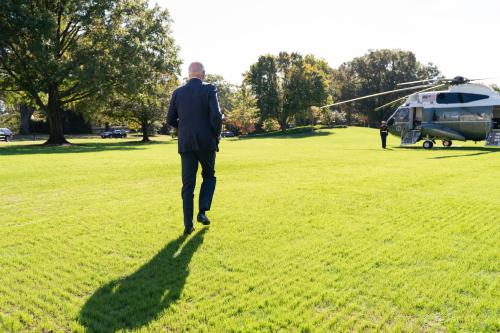
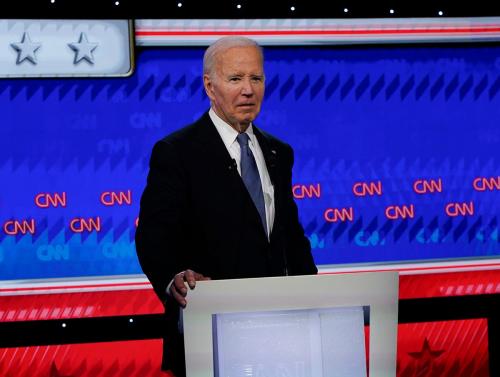
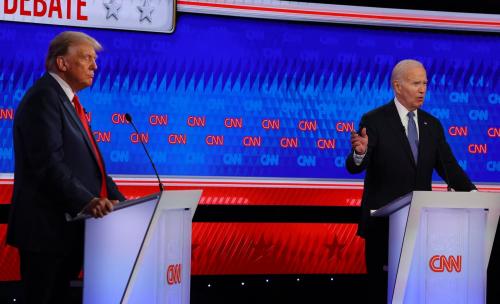


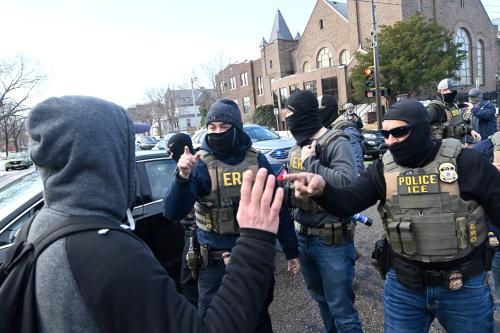
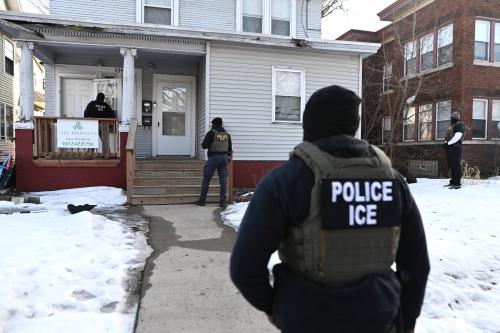
Commentary
Trump v. United States: Explaining the outrage
July 12, 2024